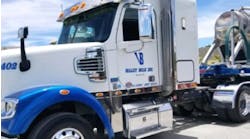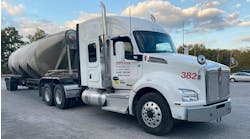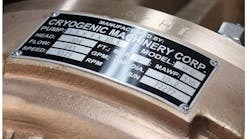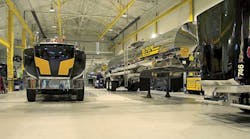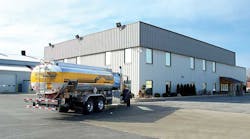New headquarters terminal strengthens Altom Transport maintenance program
ABOUT a year ago, Altom Transport Inc began moving into a new headquarters terminal in Hammond, Indiana. It didn’t take long for the new facility to begin paying dividends.
The headquarters side of the new terminal made it possible to consolidate corporate staff, central dispatch, and the safety department. The facility includes a large new maintenance shop that brought a 66% increase in in-house testing and inspections of code cargo tanks and a 67% increase in preventive maintenance inspections that are done in house. Finally, property taxes are much lower in Indiana than in the Chicago, Illinois-area, where the carrier previously was located.
“This move was a win for us in every respect,” says Thomas J Warren, Altom Transport executive vice-president. “We really had outgrown our Alsip, Illinois, location, and we needed to bring all of our corporate operations and staff together under one roof. We never before had safety and dispatch together with the corporate leadership. We’re certainly seeing improvements in communication and coordination.
“On the maintenance side, we essentially had an opportunity to start fresh with a facility that is sized appropriately for our needs and capabilities. We have a significantly larger shop that enables us to service more of our fleet in-house. We can do all of the cargo tank testing and inspections for our fleet in the upper Midwest, and we can handle virtually all of the warranty work on our tractors and trailers.
“We definitely believe that this move has helped position us for more growth in coming years. We are very optimistic about the future of this company.”
Customer focus
Established in 1978, the tank truck carrier focuses on customers in the eastern half of the United States and hauls a wide range of chemical and petroleum products. The for-hire carrier works closely with sister company Al Warren Oil Co, which is also headquartered at the new Hammond location. The wholesale petroleum marketer that was founded in 1948 by Tom Warren’s grandfather and serves customers in the greater Chicago area with a range of services including on-site fleet fueling and card-lock fuel stations.
Altom Transport, a Responsible Care partner, currently runs 125 company tractors, 90 owner-operator power units, and 486 tank trailers. The fleet operates out of terminals in Chicago; Indianapolis, Indiana; Pasadena (Houston) and Lufkin, Texas. Equipment also is stationed at several satellite locations.
In addition to the new Hammond location, Altom Transport has maintenance shops at the terminals in Chicago, Indianapolis, Pasadena, and Lufkin. In addition to general vehicle maintenance, the shops in Hammond and Pasadena also handle new truck in-service preparation.
Like so many other tank truck carriers, Altom Transport jumped into the oilfield as a crude hauler at the height of the shale boom. Unlike some of the other fleets, the carrier got out at just the right time.
“We exited crude hauling just after the first drop in oil prices in 2014,” Warren says. “At our busiest, we were running 21 crude transports. We were able to sell off all of the crude trailers for a decent price. We don’t regret getting into crude hauling. We’re always looking for growth opportunities.
“Our new headquarters terminal puts us closer to some of our core customers in northwest Indiana, and we believe that will help us grow. We are expanding our operations in Kentucky and Ohio, and we are looking at other areas that offer growth potential.”
Convenient location
The site of the new headquarters terminal is just off I-80/94 and previously served as a terminal for another petroleum marketer fleet. With just over four acres, the facility included a 20,000-sq-ft office building and a separate warehouse.
Starting in 2014, Altom Transport’s contractor completely renovated the office building, and the warehouse was gutted and turned into the new 15,000-sq-ft maintenance shop. All of the work was done under the watchful eye of Warren’s father.
By March 2015, the renovated offices were ready for occupancy, and the headquarters personnel moved in. Maintenance operations followed in August 2015.
From a maintenance personnel standpoint, the move was relatively easy. Most importantly, a majority of the maintenance team already lived in Indiana. “We didn’t lose any of our maintenance team in the move,” says Nick Anderson, shop foreman at the Hammond location.
Ten mechanics work in the shop split between two shifts that keep the facility open virtually around the clock six days a week. Most all of the mechanics have diesel engine certification and five also are qualified as registered inspectors of code cargo tanks.
“We have a good maintenance team in place, and they are able to do so much more in the new Hammond shop,” Anderson says. “Our labor costs are actually down 4%, and we’ve cut outside service vendor costs by 87%.”
The new shop serves as a Peterbilt warranty facility for the Altom Transport and Al Warren Oil truck fleets. In addition, it operates as a Polar Tank Trailer service shop internally for trailer maintenance, with the exception of code barrel work.
Dramatic improvement
The new facility is a dramatic improvement over the previous shop that was extremely cramped. Three long, wide bays provide enough room for eight tank trailers in the new shop. Most days, mechanics are working on four to five trailers and two to three tractors at a time.
The work area is spacious with high ceilings and is brightly lit with the latest in LED lighting. The shop floor was completely updated during the renovation. Floor drains were added, and the concrete floor was treated with an epoxy coating. Infrared heating and new overhead doors were installed.
Air, water, and lubricants are available on hose reels at stations on steel beams separating the second and third bays. Rails above the two primary trailer bays have fall protection for the safety of mechanics working on top of trailers.
Four trailer spots in the new shop are outfitted for confined space entry. “In contrast, we could only do one confined space entry at a time in the old shop,” Anderson says.
Twin 15-horsepower Ingersoll Rand compressors supply compressed air at 100-cubic-feet-per-minute throughout the shop. Welding stations in one corner of the shop are equipped with Miller welding machines.
Mechanics have full access to the roomy parts storage area, which is stocked with virtually everything needed to keep the Altom Transport fleet running safely and efficiently. An outside contractor keeps an ample supply of tire/wheel assemblies ready to go on a rack in the parts room.
Still a work in progress is the section of the maintenance building that has been set aside for use as an indoor bulk plant that can store about 100,000 gallons of diesel, biodiesel, and diesel exhaust fluid. Plastic storage tanks were being installed as this issue of Bulk Transporter went to press.
Computer technology
Computer work stations running TMT Fleet Maintenance software are strategically positioned throughout the shop, including the parts department. A range of computerized diagnostic equipment also is used in the maintenance operation.
“Mechanics enter data on every repair job they do, and they scan the barcode for every part used,” Anderson says. “We track all of our warranty work, and the system helped us recover an additional $200,000 from warranty repairs over the past year. Our mechanics also use Cummins Insight software for engine diagnostics and the Lite-Check system for vehicle electrical tests.”
Mechanics keep a close watch over the fleet, and that includes both company vehicles and owner-operator tractors. “Company vehicles get regular attention in our maintenance shops, and we are inspecting owner-operator trucks every 90 days,” Anderson says. “We watch driver pre-trip and post-trip inspections more closely. It is all paying off in reduced visible defects recorded during roadside inspections and better CSA (Compliance, Safety, Accountability) scores.”
Maintenance program improvements also are helping the tank truck carrier to tweak its fleet specifications to improve vehicle performance and safety. The process of refining vehicle specifications is continual.
Fleet equipment
Altom Transport runs solely Peterbilt tractors, and the 11 newest units are Model 579 conventionals with 80-inch sleepers. The tractors were specified with Cummins ISX15 engines rated at 450 horsepower and Eaton 13-speed manual transmissions. Engines are governed at 62-65 miles per hour and have Smart Torque gear-down protection. Synthetic lubricants from Chevron and Shell are used across the board in the fleet.
Altom Transport specifies Bendix disc brake and roll stability on the tractors. The carrier also runs SmartWay-certified tires from Bridgestone and Michelin on tractors and trailers.
Technology systems include PeopleNet BLU II on-board computers that track vehicle operation and handle electronic driver logs. “We’re also able to record PTO operation, which gives us the ability to deduct PTO operating time from our fuel taxes,” says Russ Brownfield, Altom Transport fleet manager. “Typically, PTO operation adds up to 1-3 hours per delivery and roughly 10% of trip time.”
Finding room on the tractor frame rails for pumps, compressors, and other equipment is becoming more challenging by the day. On its newest tractors, the carrier has switched to twin 90-gallon fuel tanks, providing a 1,000-mile range.
Extra room on the frame helped encourage Altom Transport to begin specifying Thermo King Tri Pac auxiliary power units with an electrical inverter last year to reduce tractor engine idle time and save fuel.
In addition to Roper pumps for product handling, the carrier is testing a new system from STAC Inc that combines a hydraulic pump with a direct linkage to an Ingersoll Rand compressor. “This arrangement gives us faster product loading times and enables us to handle higher viscosity products with the compressor,” Brownfield says.
For years the fleet has been mounting a product hose rack behind the cab of the tractors, but the carrier was never completely satisfied with the products on the market. Recently fleet managers were able to convince ProTech to build a better product.
It’s all part of an effort to do a better job of managing product hoses, according to Brownfield. “We’re paying more attention to product hoses in terms of cost, safety, and compliance,” he says. “We buy all of our hoses and fittings from Hart Industries, and we do all of the testing in-house using Hart equipment. We also have a hose recycle arrangement with Hart.”
The carrier has switched from two- and three-inch hoses to 2 ½-inch hoses, which reduces the amount and variety of hose a driver has to carry on the truck. Drivers are directly responsible for the condition of the hoses carried on the truck. They sign for the hoses and are expected to inspect them during pre-trip inspections.
“We expect four years life from a product hose,” Brownfield says. “We’re seeing good results from the program. We’re already saving $50,000 to $100,000 a year through reduced hose loss.”
Polar Tank Trailer Inc is the supplier of choice for most of the chemical tankers in the fleet. Stainless steel DOT407 trailers are specified with Girard pressure-relief vents, Betts vapor recovery and outlet valves, Polar domelids, and hose tubes. Four- and six-compartment DOT406 aluminum trailers are used for lube oils and solvents.
On its newest tank trailers, Altom Transport has specified Meritor disk brakes. Running gear includes Hendrickson Intraax axle/air-suspension systems. ♦
